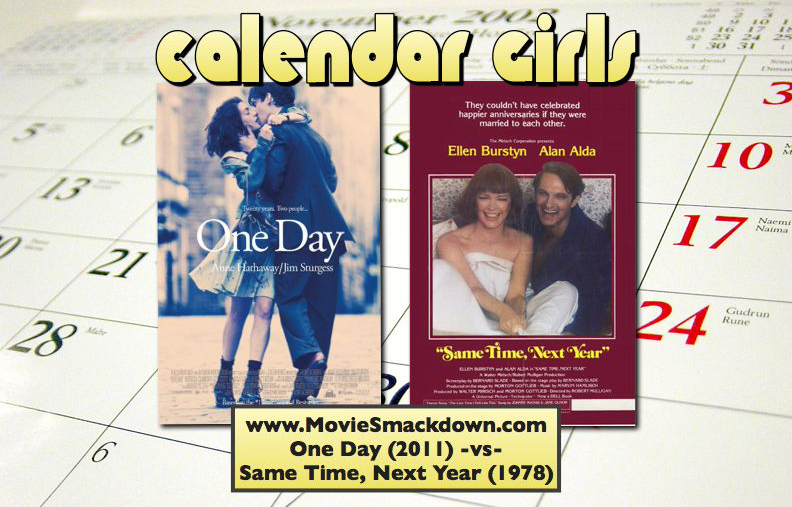
 The Smackdown
The Smackdown
Warning: this Smackdown is not your typical 15-rounder, with a decision coming after only a few hours of fighting. No, this stretches far, far longer… several decades, in fact. That’s because both our contenders span over 20 years in the lives of their central couples.
In the case of One Day, which bows this weekend at a theater near you, we meet our likable pair — playboy Dexter (Jim Sturgess) and geeky Emma (Anne Hathaway) — on graduation day from the University of Edinburgh in 1988, and track them as they meet, or intend to meet, on the same day through subsequent years.
More or less the same plot device is employed in Same Time, Next Year, in which accountant George (Alan Alda) and housewife and later businesswoman Doris (Ellen Burstyn) meet cute and hook up instantly, despite being solidly married to other people. After this initial flush of romance, they agree to meet annually around the same time, in the same inn, to conduct their affair.
Two long-term relationships outside marriage, each lasting a day at a time, annually, over the decades. Both survive personal shakeups and societal upheaval, but only one can survive this Smackdown.
[singlepic id=1187 w=320 h=240 float=right]
The Challenger
Like our defending champion, One Day is an adaptation, in this case of a 2009 book by David Nicholls, who also wrote the screenplay. The movie’s story closely follows the book of the same name, starting with the graduation of our two English protagonists, Dexter and Emma, who run in more or less the same crowd of people, but are not otherwise familiar with each other.
This looks set to change when, fueled by post-graduation drinks, she agrees to take him home for what’s left of the night. The deal isn’t clinched, however; awkward and perhaps virginal Emma fumbles and stumbles, and the moment is lost. But the two have enough chemistry to want a “friends only” relationship, and they agree to mark the anniversary of their almost-hookup by meeting on the same day every subsequent year.
Their post-graduation lives diverge significantly. Both set up camp in London, with Dexter aiming to win a job in TV production and earnest, idealistic Emma hoping for a career bettering the world in some way. While Dexter quickly becomes the host of a horrifyingly loud and crass late night dance party show, Emma’s ambitions seemingly grind to a halt. Their magic day comes annually, and in the first few years the two very much enjoy being in each other’s company, so much so that the Dexter nearly succeeds in pushing their relationship to the next level. The more reserved Emma, however, always declines to make it physical.
Over the years, their fortunes reverse. Dexter’s career peaks early, along with his growing dependence on booze and drugs. He even misses a few of their annual rendezvouses. Emma, meanwhile, finds a satisfying job as an elementary school teacher and later pens the novel she’s been itching to write. Both friends get married to other, lesser people, but we know all along they’re only meant for each other. The two finally do get together, but fate deals an evil hand… until several final, cathartic moments put a sweet spin on an otherwise bitter conclusion.
[singlepic id=1186 w=320 h=240 float=right]
The Defending Champion
Same Time, Next Year, adapted by Bernard Slade from his stage play, moves its lead characters through more tumultuous times than its youthful challenger. George and Doris’ affair starts in the straitlaced 1950s and lasts through the wild 1960s and reflective 1970s; the relationship between the two mirrors developments in the wider society. Their affair begins in a fit of torrid passion. Happiply, the two discover an instant and strong rapport to go along with the attraction; they’re obviously soul mates. But secrecy and separation will be necessary because both are happily married with children.
The film hops around through time. Its story is divided into scenes taking place every half-decade or so beginning in 1951 and concluding when the two are late middle-aged in 1978. Society affects them both, particularly in the divisive, heady late 1960s. George’s innate conservatism is sharpened by the death of his son in the Vietnam war, while Doris goes in the other direction as a bead-wearing, establishment-hating hippie. By the time their next meeting takes place in 1971, George is the one spouting cheap philosophy and talking about finding one’s self, and Doris, has joined the burgeoning feminist movement and become an entrepreneur.
Through it all, their unusual commitment to each other never wavers, and their chemistry is tangible and strong. In the final segment, we see the two of them as graying adults headed into retirement, more comfortable with themselves as well as eternally comfortable and compatible with each other. Their affair does come to light in one of the marriages, but that marriage continues, as does George and Doris’ liaison. As the movie ends, we’re sure they’ll continue to get together every year in that cozy little California inn until one of them drops.
The Scorecard
In some respects, it’s hard to tell these contenders apart even though both were made in two distinct eras of filmmaking. Both have similar themes and scope, tracking the looooong development of the relationship of two people who belong together but have a hard time coming to grips with the fact.
But there are a few distinctions. In Same Time, the affair starts nearly right away, so the remainder of the story concentrates on keeping George and Doris together as opposed to getting them there. One Day travels a slightly more conventional rom-com path, with its protagonists spending much of their time apart while increasingly realizing they shouldn’t be separated at all. This makes One Day the more dynamic of the two films, at least in terms of its central relationship. More humor and story flow from their fumbling attempts to find love and success with the wrong people, and the mistakes they make without having each other’s input and support. Same Time, Next Year largely concerns itself with the guilt George and Doris feel and the outward differences they display over the years before settling into a more blissful, carefree state of mind.
This is reflected in how these stories unfold. One Day jumps around from location to location, country to country, from the gloom of medieval Edinburgh to the pretty beaches of France and the scruffiness of inner-city London. In contrast, its rival nails the protagonists to the same location, that long-standing California inn. Those exotic locations help make One Day feel more like a full-bodied, proper movie than its older, more stage-bound counterpart.
The Decision
These two opponents are made with care and craft by directors Lone Schefring (One Day) and Robert Mulligan (Same Time, Next Year), and each clearly follows the paths of its romantic pair. All leads act their parts thoroughly and well. George and Doris win slightly more points for being the more charming and endearing couple. Hathaway’s British accent is worthy of her namesake (Shakespeare’s wife), and her character Emma is appealingly smart, sarcastic and geeky, but Dexter slides into stupid, destructive self-pity a few too many times for us to root for him entirely.
One Day is also populated by lively, full-blooded secondary characters who do more than just stock the story, they play a major role in it. Dexter’s warm, intelligent mother Alison (played by the fine Patricia Clarkson) eventually has a deep influence on his actions, while Emma’s ex-husband Ian helps wrap up the story with a wise, cathartic move at the end.
Same Day, Next Year, meanwhile, never escapes its theatrical roots and feels stagy as a result. It’s essentially a one-room piece with two actors, and although the movie treats us to shots of the gorgeous coastline bordering the inn, we feel the inherent claustrophobia of the material. So for its more dynamic nature, and for bringing more and varied characters into the proceedings, One Day is the film you’re more likely to want to re-connect with every year.




Perhaps you didn’t know but the reason Same Time feels like a stage play is because it IS a film adaptation of a play from a few years earlier.
I enjoy your review of both films and your comparison is mostly spot-on. But wholeheartedly disagree with your final decision.
It is for all the reasons that you list that “Same Time Next Year” is the superior film. It doesn’t need the multiple locations, additional characters, or “when will they get together” shtick to keep it interesting.
I think it comes down to the age of the audience, and their generational taste differences.
Alda’s breakdown scene alone… heartbreaking.
Thanks for the compliments, NanFM, and we’re glad you enjoyed the Smack! SAME TIME, NEXT YEAR did indeed feature some fine acting, and I also liked the fact that the leads more or less start off as a couple instead of spending the whole movie getting there. It just felt too much like a stage play to me – any time I feel I’m claustrophobically trapped inside a room with two people isn’t, for me, a good movie-going experience.
I doubt I’ll go see “One Day”. Having reached almost the same age as the characters in “Same Time Next Year” at the end of the movie, I’m a little past rom-coms. However, I’m guessing that, despite the presence of “lively, full-blooded secondary characters” and the locations varying from “the gloom of medieval Edinburgh to the pretty beaches of France and the scruffiness of inner-city London”, Jim Sturgess (who he?) and Anne Hathaway hardly compare in acting ability and stage presence as Alan Alda (at the top of his game in 1978) and the ever-reliable Ellen Burstyn.
Nadine, HR and Ken — Glad you appreciated the Smackdown. We usually review films against more recent releases, but in this case the comparison was so obvious. Weird that you don’t see it made more often in the mainstream media…
And French — Yeah, we like Volkman too. Check back early next week for his review of The Debt.
ee
Phew! Thought it was only me that was going mad and remembered the Alan/Ellen film and wondered why no-one else had brought up the similarities. Thanks for preserving my sanity. Great review too.
I ditto everything Nadine says. Why isn’t the comparison noted?
Thanks for the review.
Thank you so much for this review. I’ve been hearing and seeing so many reviews and interviews and ads for One Day and keep thinking, isn’t that a lot like an older film called Same Time Next Year, with Alan Alda? Yet, no one mentioned the similarity and it was making me feel like crazy. This review is setting me free from worrying over this and it’s also a very good review and helpful for deciding to see One Day.
Just wanna say that this Volkman guy writes a damn good review… not just this one, but the bunch he’s done lately. Keep that shit up, we like it out here in Boise.